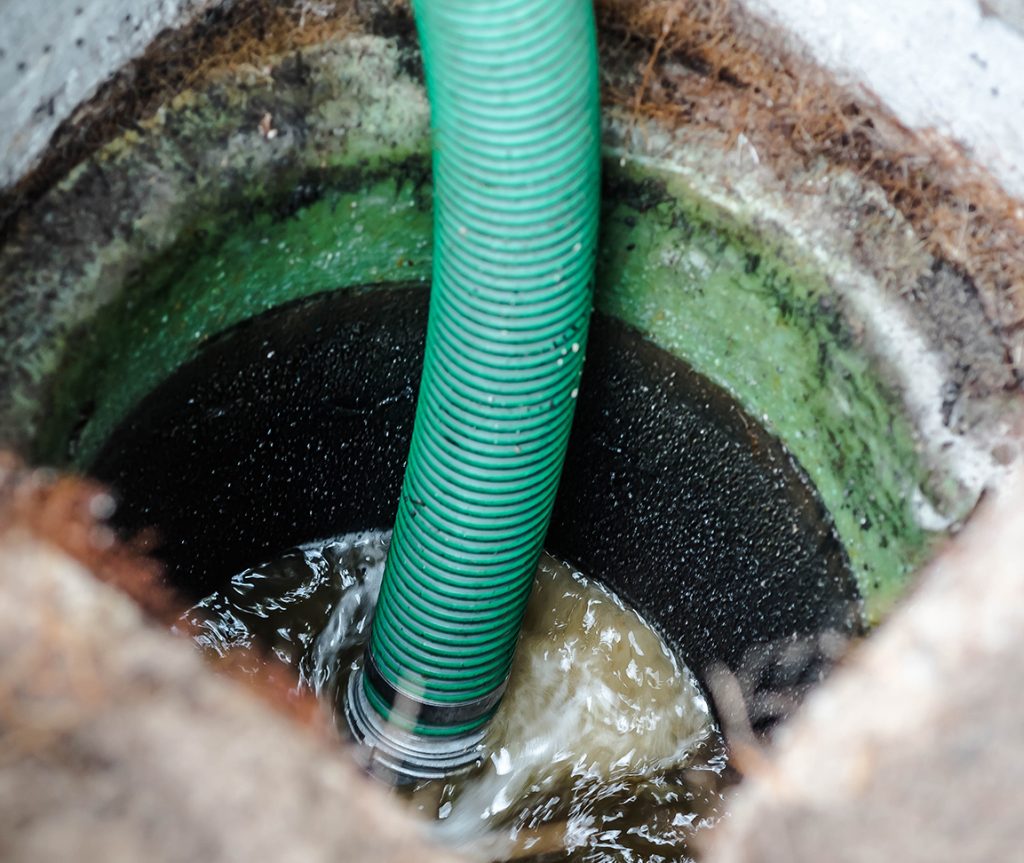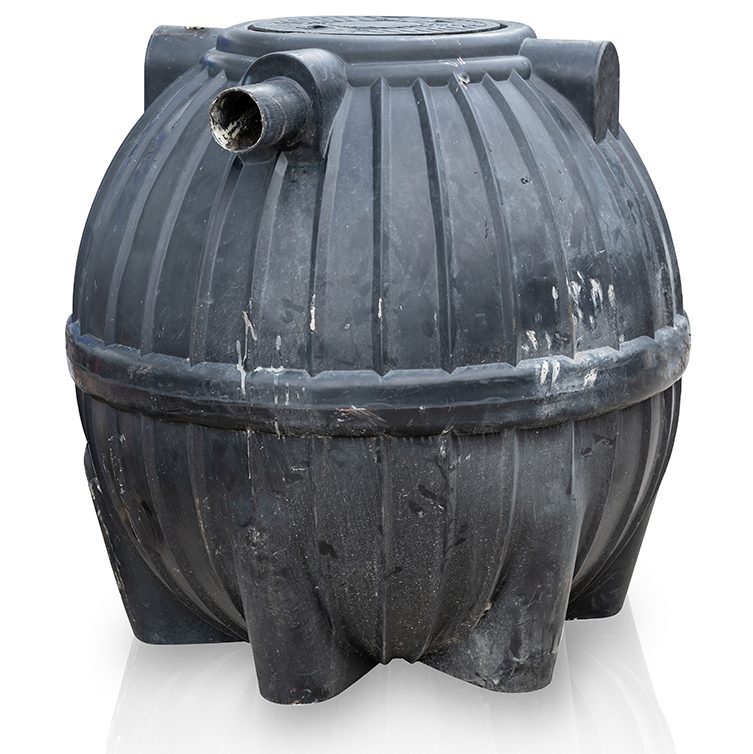February 12, 2026
Extreme weather is the new normal – this is what it means for drainage maintenance
Prolonged rainfall this winter is a sign of a pattern of weather we must...
If a residential property or business premises cannot be connected to the main sewerage system, the owners must install their own facilities for storing and processing wastewater.
The most commons methods involve the installation of a septic tank, a sewage treatment plant, or a cesspit (or cesspool), referred to collectively as off-mains drainage systems.
Catalyst provides a full range of specialist services to support the installation, cleaning and maintenance of these off mains water management assets, anywhere in the UK.

These include insurance companies, loss adjusters, insurance brokers, commercial businesses, property landlords, public organisations, and directly for home owners.
There are three commonly-used options for treatment, removal and discharge of wastewater that cannot enter a mains sewage system. These are the installation of cesspit, septic tanks or sewage treatment plants.
Treatment systems must meet British Standards. Currently, for new systems these are BS EN 12566 for sewage treatment plants and BS 6297:2007 for associated drainage fields.
All three systems must also meet requirements in new general binding rules for preventing discharge of sewage to a water course. See government advice on new general binding rules.
Cesspits, also referred to as cesspools, are large tanks, buried underground, used to hold all wastewater generated by a property. The wastewater is then collected at regular intervals for disposal in an authorised site.
Catalyst provides a cesspit waste collection service for many customers, both commercial and domestic. It is important that the waste is collected by a reputable company that can demonstrate it has the appropriate waste carrier licence. Catalyst will draw up a service agreement to empty your cesspit at the frequency that is appropriate for your property, depending on the size of the tank and utilisation level of the wastewater system.
A septic tank is also a buried tank. It has at least two subdivided chambers. When wastewater enters the first chamber, solid waste sinks to the bottom and scum, which may contain fats and oils, collects on the surface.
The cleaner water in between is allowed to flow into a second chamber where the separation process is repeated. This process can be repeated in a third chamber. If circumstances allow, the water can then be discharged into the ground through a drainage field system.
Sewage treatment plants, also known as package treatment plants, combine the wastewater separation process with bio-treatment.
First, solids are separated from the water in the same way as with a septic tank. The water is then sent through a mechanical aeration tank, where bacteria is used to further break down harmful waste. The resulting wastewater can then be discharged into a drainage field or watercourse.
As with septic tanks, the new general binding rules for small sewage discharge to the ground apply.
Catalyst provides a comprehensive range of services to support off mains water treatment systems, including cesspits, septic tanks and sewage treatment plants. From providing trusted expert advice on legislation and regulation, to installing systems and maintaining them, our professional teams are ready to assist.
The Catalyst team includes senior professionals with many years’ experience of tank investigations, installing and maintaining septic tanks and sewage treatment systems.
If you are having issues with your septic tank, want to install a system, upgrade the one you have or are concerned about how it needs to be maintained, call us. We can help. We can also provide a Home Buyer’s Report on the condition and suitability of any off-mains installation to ensure it is factored in to the property value and a decision to purchase.
Catalyst specialists can attend and investigate and will provide you with a full technical report, detailing the extent and condition of your septic tank or sewage treatment plant, legal and regulatory implications of its use, and the best options for maintaining or replacing it, as required.
Septic tanks, sewage treatment plants and cesspits (cesspools) need to be emptied in line with manufacturers guidelines. This is important to ensure your property and the environment is protected from sewage flooding, and to prevent possible poor functionality or damage to the tank.
Catalyst provides an efficient and cost-effective tank emptying and cleaning service across the UK. Our robust service management system will ensure your septic tank or sewage treatment plant is kept in optimal condition.

Septic tank and sewage treatment plant maintenance and repair must be carried out by specialist septic tank cleaning companies, so the work is done correctly, safely and to a high standard.
Catalyst has highly trained specialists ready to respond to any septic tank issues across the UK.
Catalyst are experts in removing redundant or defective septic tanks and the installation of new tanks or sewage treatment plants. We support clients through every step of the installation process, including:
Catalyst has highly-skilled approved teams to carry out tank installation work. We also guide customers through the implications of the new general binding rules for small sewage discharge to ground.
Catalyst designs and installs drainage fields, also known as soakaways, for a wide range of clients, including domestic property owners, businesses and public sector organisations, including parish councils.
Septic tanks can only now drain into a drainage field, which must be of a sufficient size, in the right kind of ground, located far enough away from water courses, such as rivers, streams and drainage ditches.
Our in-house Tank experts can work with you to assess your land to ensure a drainage field can be installed and how it must be designed, including materials used and structure.
As experts in off mains wastewater systems, Catalyst will work with owners of these assets, and their representatives, such as insurance companies and construction contractors, to ensure their systems comply with all environmental and waste legislation.
Catalyst can advise septic tanks owners on a range of options to ensure they meet the discharge regulations enforced by the Environment Agency. These include:
Connect to a mains sewer
With the development of the sewer network since the septic tank was installed, it may now be cost-effective to connect the property to the nearest sewer.
Install a drainage field
This will only be possible if the land meets the regulations in place in your local area for their design and installation.
Install a sewage treatment plant
The additional biological processing of wastewater will ensure the effluent is clean enough to continue to be discharged into a water course.
Install a secondary sewage
treatment unit
This could be further filtration or even an ultraviolet filter, which kills the bacteria before it is discharged to a water course.
Specific requirements are needed, including a permit to discharge, in a Groundwater Source Protection Zone 1 (SPZ1), which protect water sources used for commercial use or domestic consumption.
Under Environment Agency rules, septic tank ‘operators’ are liable under the regulations. Operators include:
If you notice any of these signs, contact a reputable septic tank cleaning company. Septic tanks that become overfull are at risk of being damaged.
These signs indicate the septic tank maintenance plan needs to be reviewed. Septic tanks should be emptied and cleaned before these problems occur.

Helping business and domestic customers every day of the year
February 12, 2026
Extreme weather is the new normal – this is what it means for drainage maintenance
Prolonged rainfall this winter is a sign of a pattern of weather we must...
January 28, 2026
Community giving will continue in 2026, says Catalyst boss
Catalyst Services UK has pledged to continue to support charities, voluntary organisations and people...
December 15, 2025
Catalyst colleagues share Christmas cheer with local families
Colleagues at Catalyst Services UK have helped the company provide Christmas gifts for families,...